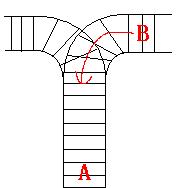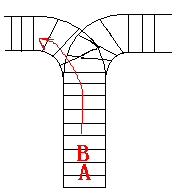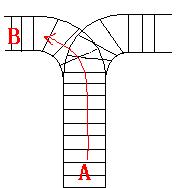标签:padding second break tail margin span using cst world



3 123 321 3 123 312
Yes. in in in out out out FINISH No. FINISHFor the first Sample Input, we let train 1 get in, then train 2 and train 3. So now train 3 is at the top of the railway, so train 3 can leave first, then train 2 and train 1. In the second Sample input, we should let train 3 leave first, so we have to let train 1 get in, then train 2 and train 3. Now we can let train 3 leave. But after that we can‘t let train 1 leave before train 2, because train 2 is at the top of the railway at the moment. So we output "No.".HintHint
#include<iostream>
#include<cstdio>
#include<cstring>
#include<algorithm>
#include<limits.h>
#include<stack>
using namespace std;
const int maxn=110;
int main()
{
stack<char>s;
int n,i,j,k,r[maxn];//r数组记录的是s1进出栈的情况
char s1[maxn],s2[maxn];
while(cin>>n>>s1>>s2)
{
i=j=0;k=1;
s.push(s1[0]);
r[0]=1;
while(i<n&&j<n)
{
if(!s.empty()&&s.top()==s2[j])
{
j++;
s.pop();
r[k++]=0;
}
else
{
if(i==n) break;
s.push(s1[++i]);
r[k++]=1;
}
}
if(i==n)
cout<<"No."<<endl<<"FINISH"<<endl;
else
{
cout<<"Yes."<<endl;
for(int i=0;i<k;i++)
{
if(r[i])
cout<<"in"<<endl;
else
cout<<"out"<<endl;
}
cout<<"FINISH"<<endl;
}
}
return 0;
}
标签:padding second break tail margin span using cst world
原文地址:http://www.cnblogs.com/liguangsunls/p/7040548.html